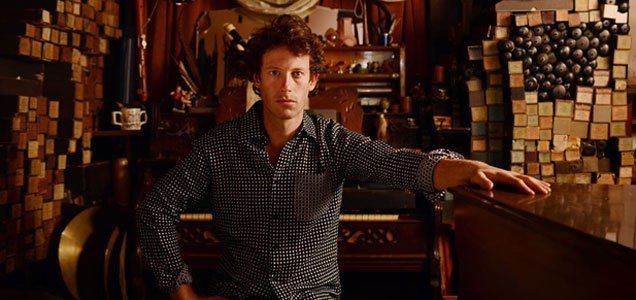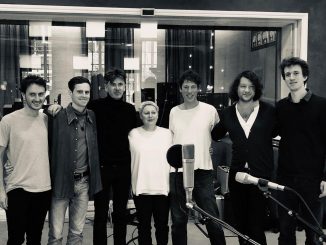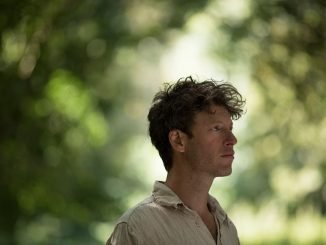
Sam Lee is very much a 21st-century artist. He travels throughout the United Kingdom and beyond recording new versions of old songs on his iPhone and laptop. The Fade in Time, Sam Lee’s second release, is very much a 21st –century album. Impassioned and hugely ambitious in scope, The Fade In Time is a major statement from an artist and group who extend the borders of traditional English/Scottish/European music beyond national boundaries to encompass Bollywood beats, Polynesian textures and contemporary classical music.
Awarded the 2011 Arts Foundation prize and nominated for the 2012 Mercury Award for his debut album, ‘Ground Of Its Own’, Sam Lee has taken his music worldwide to more than 20 countries. The driving force behind the eclectic, BBC Folk Award winning club (and label), The Nest Collective, which has brought traditional music to all kinds of new stages and venues, Sam is also a song collector who has inspired a new generation of performers to draw material from a living source, rather than just books and records.
Sam Lee and his band comprise cellist Francesca Ter-Berg, trumpeter Steve Chadwick, violinist Flora Curzon, percussionist Josh Green and koto player Jonah Brody. They entered Imogen Heap’s Hideaway Studio in Essex with Penguin Cafe’s Arthur Jeffes and Jamie Orchard-Lisle as co-producers, and spent three months laying down tracks and layering music for Sam’s new album, The Fade In Time.
From the blaring brass and martial drums of opening track, Johnnie O the Brine through to the softly closing account of The Moss House, with just Sam’s voice and Arthur Jeffes’ beautifully minimalist, elegant piano, the instrumental textures and vocals –augmented by the Roundhouse Choir on Lovely Molly – make The Fade In Time a distinctive reinterpretation of the British folk tradition.
Several of its songs, including opener Johnnie O the Brine, were learnt from Lee’s mentor, the Scottish traveller, Stanley Robertson. It’s a tale of hunting, poaching, slaughter and magic, and to form its soundscape, “I wanted something with rhythm, punch and drama to it,” says Lee. “I heard this tarantella approach, and the horns are hunting horns, inspired by Tajikistan wedding bands, spattering and spitting out these sounds”.
Also from Robertson comes the great ballad, Lord Gregory. Lee’s version begins with an archive recording of Hamish Henderson with the singer Charlotte Higgins, an elder cousin of Robertson’s. “It’s an old song, old and a long, long time ago’ says Higgins as Henderson coaxes the words from her, and you realise you’re putting an ear to something ancient, stories thought extinct but found alive and well in your own backyard. “Stanley learnt it from his mother, who recited it as a poem,” says Lee. “He’s condensed it with absolutely everything there is about rejection, love, conviction, forgiveness, empathy and compassion. It’s the song I’m most proud of, singing-wise. That’s the one I’m emotionally most connected to. It’s the centre of the album.”
[soundcloud url=”https://api.soundcloud.com/tracks/187941116″ params=”auto_play=false&hide_related=false&show_comments=true&show_user=true&show_reposts=false&visual=true” width=”100%” height=”450″ iframe=”true” /]
Poignantly, The Moon Shone On My Bed Last Night, was the last song Robertson taught Lee. “It was the last song he’d learnt from his aunt, the great singer Jeannie Robertson,” says Lee. “One day Stanley said to me, I want to teach you a song, and that was the one. It holds a very special place for me.” A classic song with its own special place in the tradition is The Blackbird, recast here with propulsive piano, strong percussion and a wall of brass. “This is one of two songs on the album that I didn’t collect,” says Sam. “It comes from May Bradley, a gypsy singer from Shropshire who was recorded in the 1950s. “She has this amazing modal tune for it, unlike anyone else’s. And lyrically, hers is so much more punchy and tenacious – about loving this soldier, being pregnant, being cast out by her community.”
The powerful, condensed version of the famous Napoleonic song Bonny Bunch of Roses comes from Freda Black, an octogenarian gypsy singer Sam has visited many times on the Hampshire-Sussex borders. As Lord Gregory began with the voices of Henderson and Higgins, so Bonny Bunch begins with an archive recording, an Eastern European cantor singer from whom Sam takes the lead as the band rises with a driving fife and drum accompaniment. These and Lee’s own field recordings have a key role on the album. At the close of Over Yonders Hill, a staple of the band’s set and a tragic lament that deals with herbal remedies and plant spirits, we have the voice of Freda Black reciting the song’s verses to the soft metronomic sound of a clock in her sitting room, quietly framing the expansive arrangements we’ve just heard. Says Lee, “It was such a dreamlike moment – you could hear the process of her remembering all these fragments jumbled in the deep past, and extracting them out of this stream of consciousness.” And the clock going in the background, time ticking away.
Which brings us to the title, The Fade In Time. “It’s the fade-in time, and the fading out that happens in time. Which reflects the songs – what happens to this experience and memory; how it dissipates, disappears there and reappears here…”




Be the first to comment